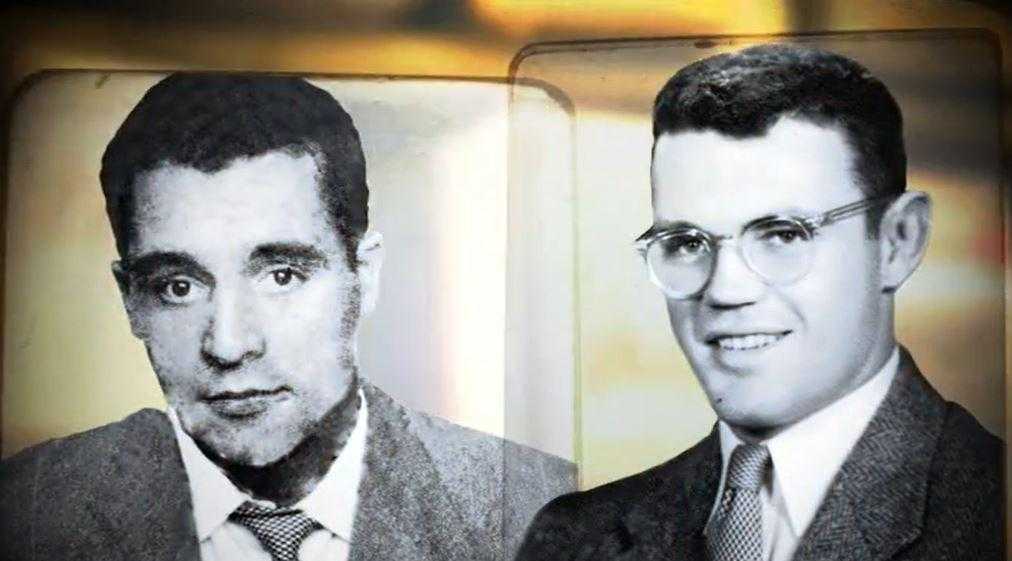
What would it be like to have two decades pass, trapped by the enemy far from home… in dismal conditions, under constant psychological duress… no contact with loved ones or the outside world… not knowing when or if freedom would come calling? Few will ever know the hardships that CIA paramilitary officers John Downey and Richard Fecteau endured. Yet, through it all, they clung to the hope that the Agency would never abandon them. The Agency never did. This is their story of extraordinary fidelity.
* * * * *
In 1949, Chinese communist insurgents led by Mao Zedong seized power from the Chinese Nationalists and established the People’s Republic of China (PRC). Washington refused to recognize the PRC and instead embarked on a campaign to undermine and replace the communist regime.
The following year, in neighboring Korea, U.S.-led United Nations forces advanced across the 38th parallel to fight the Soviet-backed north that had invaded the south. Mao sent in forces to reinforce his communist allies. The Korean War turned the Cold War red hot.
John “Jack” Downey and Richard “Dick” Fecteau joined CIA in 1951 fresh out of college and just as America pivoted from fighting fascists in World War II to rolling back the spread of communism. By the spring of 1952, Downey was in the Far East training teams of ethnic Chinese agents to operate inside communist territory.
CIA soon tapped Downey and Fecteau to accompany Civil Air Transport (CAT) pilots Norman Schwartz and Robert Snoddy on a flight mission to extract one of the Chinese agents and recover intelligence he had gathered. The plan involved the plane flying 50 feet above the ground with a hook designed to catch a line connected to the harness worn by the agent; the man would be jolted up into the air and safely reeled in. It was a daring maneuver that the Agency had never carried out before.
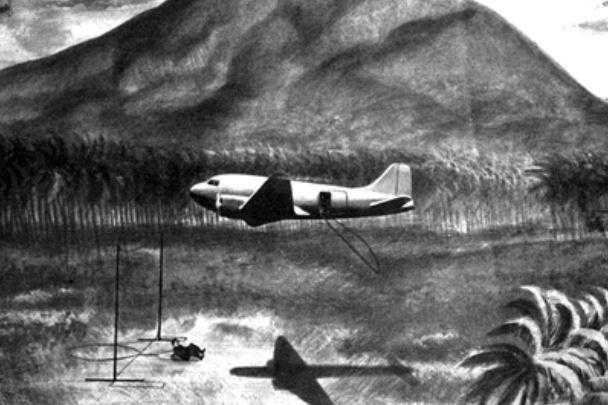
An illustration of a snatch pickup from a 1944 U.S. Army Air Forces manual.
On the evening of November 29, 1952, Downey and Fecteau boarded the C-47 with a final set of instructions from CIA’s ground crew: “If you get shot down, don’t tell ‘em you’re CIA. Tell ‘em anything, but don’t tell ‘em you’re CIA.”
The four men arrived at the drop zone shortly after midnight. A nearly-full moon lit the snowy terrain. As they swooped in to collect their target, anti-aircraft tracer fire came up through the floor. They had flown into a trap. The plane crash-landed, and Schwartz and Snoddy tragically died at the scene.
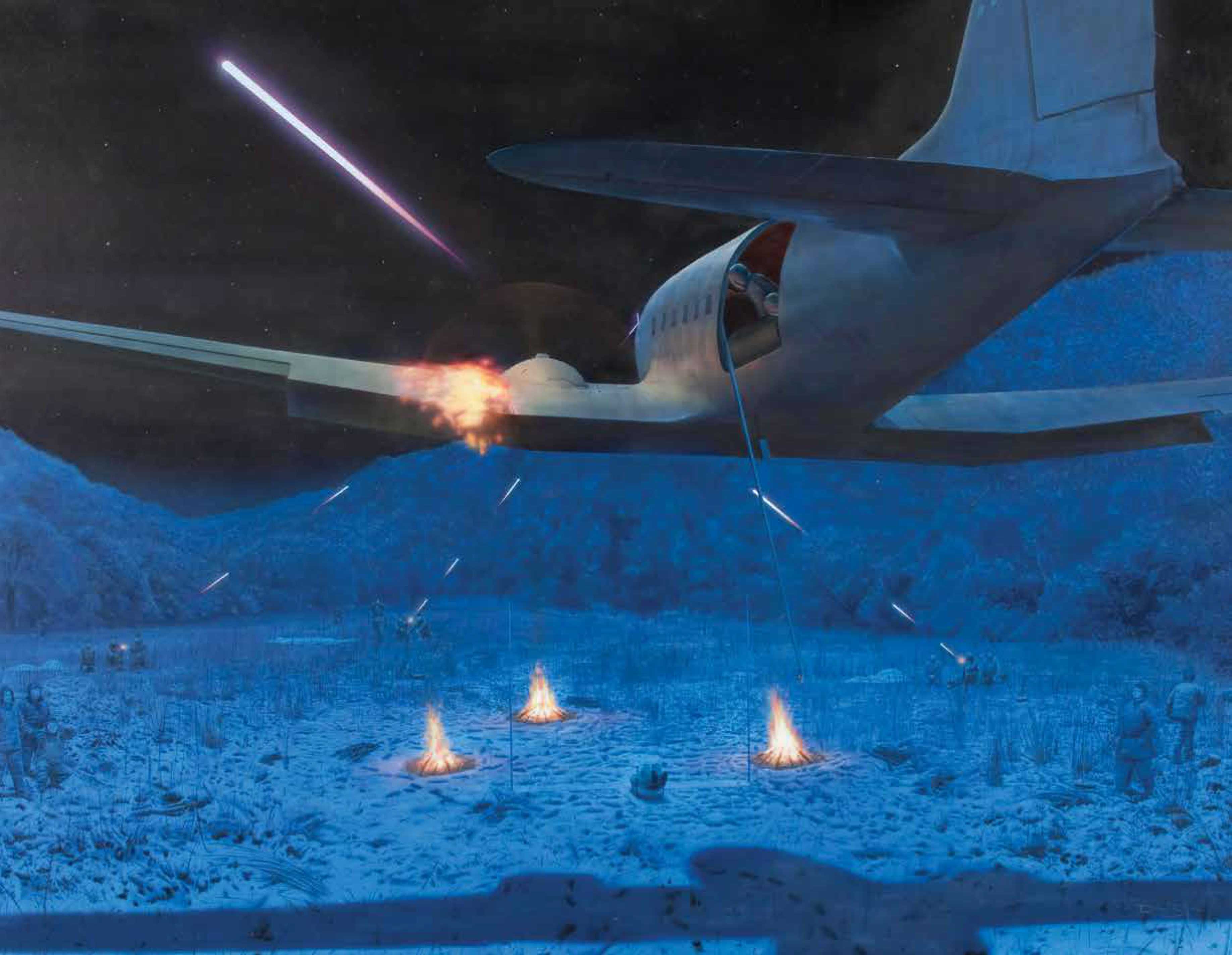
The painting, “Ambush in Manchuria,” depicts the C-47—piloted by Norman Schwartz and Robert Snoddy and carrying John Downey and Richard Fecteau—in the moments before it was shot down by the Chinese in 1952. © Dru Blair
A shaken Downey and Fecteau stumbled out of the wreckage and were surrounded by Chinese security forces. Once in custody, one captor warned: “Your future is very dark.”
* * * * *
Hours passed with no radar contact. When Downey and Fecteau’s team did not hear back from them and the Chinese were similarly quiet, CIA presumed all of the men were dead. However, the two survivors were actually transported to the Manchurian capital of Shenyang, where they were placed in solitary confinement.
The Chinese interrogated them month after month for up to 20 hours a day seeking names, locations, and other operational details. Downey and Fecteau were isolated, sleep-deprived, and dehumanized but did not divulge sensitive information.
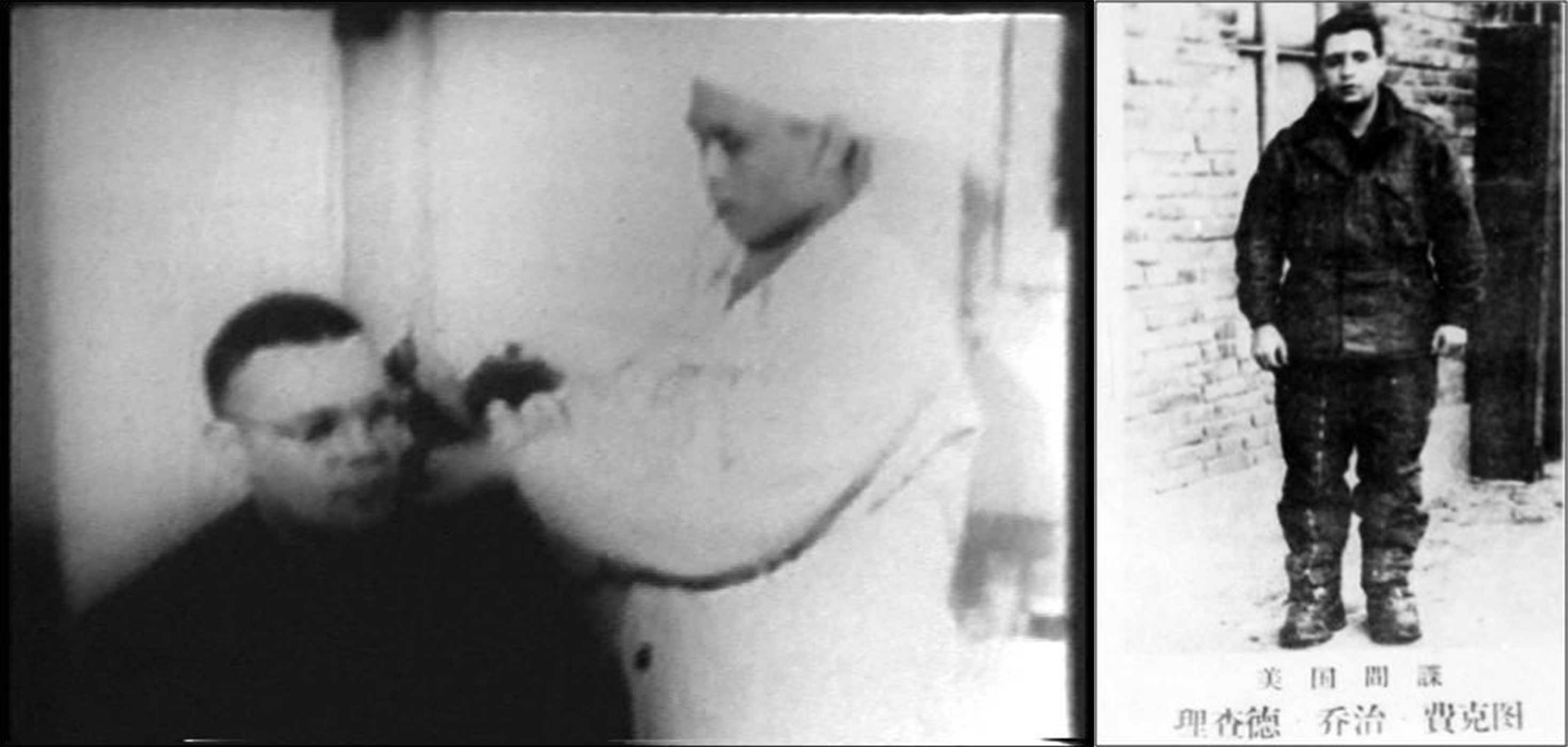
Downey in captivity (left); Fecteau in captivity (right).
As the first anniversary of the C-47’s loss approached, CIA remained unaware that two of the men were actually alive. The Agency even officially declared them dead so that their surviving family members could have closure and receive benefits from insurance proceeds.
Nearly two years after their capture, the PRC put the Americans on trial in the fall of 1954. In the courtroom, Fecteau saw Downey—for the first time since their capture—wearing an ill-fitting prison suit. Shoulder-to-shoulder with his beleaguered friend, he quipped, “Hey Jack, who’s your tailor?”
The PRC court sentenced Fecteau to 20 years and Downey to life. After receiving their sentences, the young men returned to solitary confinement to face the prospect of dying inside a Chinese prison cell.
On the other side of the world, the U.S. was stunned when China finally broke its two-year silence. “This is Radio Peking. John Thomas Downey and Richard George Fecteau, both special agents of the Central Intelligence Agency, were convicted of seriously jeopardizing the security of China…”
* * * * *
The shock news that Downey and Fecteau were alive and incarcerated in communist China did not gain diplomatic traction because the U.S. and the PRC were locked in an impasse. More than 30,000 American troops had been killed in the Korean War, and now that it was over, senior U.S. Government officials feared that advocating for the CIA officers' release could endanger negotiations for military personnel still held in Chinese custody.
Nevertheless, the Agency continuously lobbied top State Department and Pentagon counterparts to pressure Beijing to release Downey and Fecteau and sought ways to support them and their families. Behind the scenes, CIA facilitated several family members’ trips to China to visit the prison beginning in 1958, periodically promoted the men alongside their peers, and placed their earnings in escrow to accrue interest. For Fecteau, the allotments covered his daughters’ education and his elderly parents’ living expenses. CIA hoped that the investments would provide financial security even if the Agency could not give back their lost years.
As the years passed, the men were deprived of their lives with loved ones back home and remained isolated from the world. Just outside the walls of their cells, Chinese society was reeling from famine brought on by the communists’ Great Leap Forward and the turmoil from the Cultural Revolution. Unbeknownst to the men, a rock and roll icon named Elvis had risen to fame, a man walked on the moon, and America was experiencing profound social and political transformation as the Civil Rights Movement and counterculture challenged traditional norms amid the escalating Vietnam War.
In an effort to unite the American people, newly-elected President Nixon initiated a bold foreign policy shift in the late 1960s. This strategy led to formal diplomatic rapprochement between the United States and the PRC beginning with Henry Kissinger’s secret visit to Beijing in 1971.
* * * * *
The date was December 10, 1971. In the middle of the night, Fecteau was spirited away by train and sent across the Lo Wu Bridge to Hong Kong. On the other side, a British Army officer awaited the unusual sight – an American, wearing a Mao suit.
“Who are you?”
“My name is Richard Fecteau. I was shot down during the Korean War.”
“What war?”
“The Korean War.”
“That was a long time ago.”
“I know.”
Fecteau was a free man and on his way home at last. Once on American soil, he noticed strangers all around with crazy hairdos, wearing strange clothes – it was as if he were in a foreign land. His twin baby girls were now young women. Most of all, he was worried about his friend who was still imprisoned.
When it was Downey’s turn to come home, he began the same journey that Fecteau completed on March 12, 1973 – after spending more than twenty years in Chinese captivity. He swelled with emotion when the British officer standing on the other side of the Lo Wu Bridge threw him a salute. He knew then that he was back amongst friends.
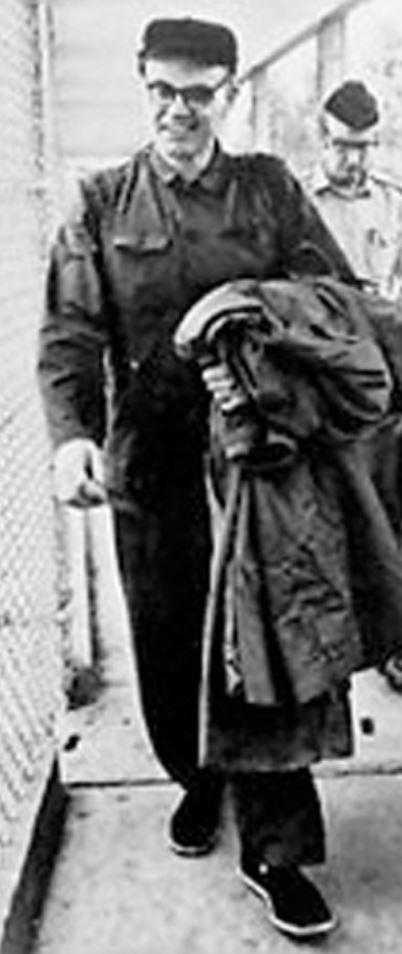
Downey, on his way to freedom, smiling while crossing into Hong Kong, 1973.
CIA hastened to offer both men their jobs back. After all, they were the consummate paramilitary officers who maintained extraordinary fidelity. The excitement had lost its allure, however, and the ever-humble Downey turned it down with, “I just don’t think I’m cut out for this kind of work.”
Downey, a Yale graduate, went on to pursue a law degree from Harvard and returned to his home state of Connecticut where he became a respected judge. Fecteau was honored when his alma mater invited him to return to Boston University as the assistant athletic director; he retired in 1989.
* * * * *
In 1998, CIA awarded Downey and Fecteau the Director’s Medal, and in 2013, Headquarters welcomed the heroes and their families back to Langley. An audience of CIA officers roared with applause as the former officers received the Agency’s highest honor, the Distinguished Intelligence Cross, for their valor and sacrifice.
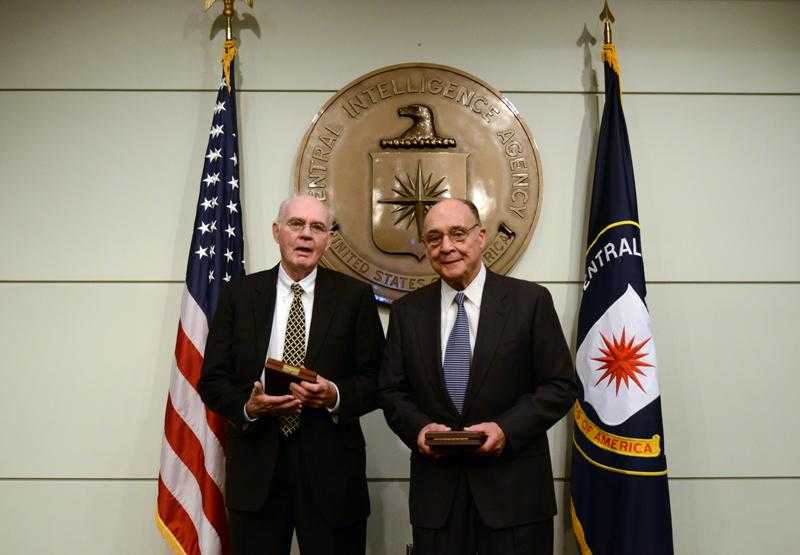
Jack Downey (left) and Dick Fecteau (right) honored with CIA’s Distinguished Intelligence Cross at Headquarters in 2013.
Fecteau thanked the Agency for the tremendous recognition. “On one hand, I really don’t know if I deserve this very special award. On the other hand, I am very pleased and very proud to be so honored. For all of you in the Agency who believe that Jack and I deserve this award, my heart goes out to you.”
Downey recognized his family for their support during and after his years in captivity, as well as the late Schwartz and Snoddy for their heroic piloting. “I want to thank my good friend Dick Fecteau. He couldn’t be a better guy to spend 20 years together with. We’ve had many good times before and especially since. Dick, it’s been a pleasure. If we had to do it again, you’d be the only one I’d want with me.”
Downey passed away in 2014. Today, Fecteau is a living legend at 98 years old and enjoys being with family in his hometown of Lynn, Massachusetts.
* * * * *
For a more in-depth look at the saga of Downey and Fecteau, check out Studies in Intelligence (Vol. 50. No. 4) "Extraordinary Fidelity: Two Prisoners in China, 1952-73," as well as the one-hour documentary, "Extraordinary Fidelity" (2010) that chronicles their captivity:
[This story was originally published in 2007. It has been updated to incorporate additional images and information.]